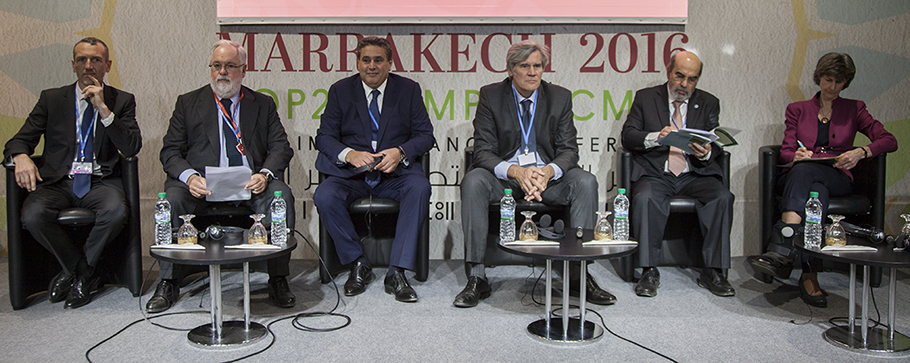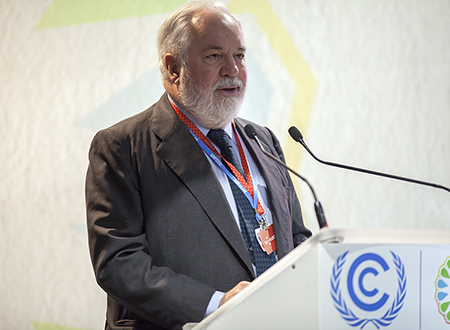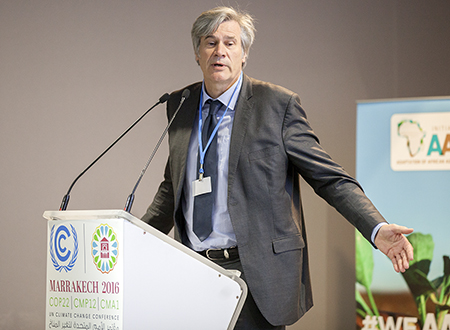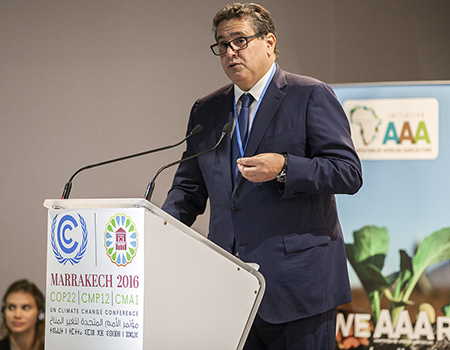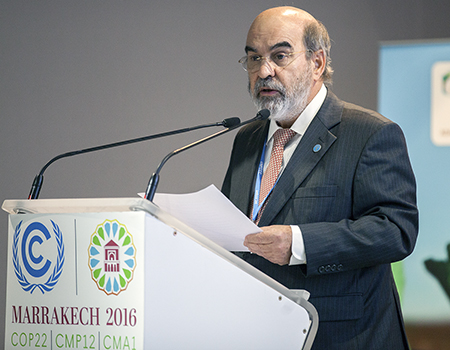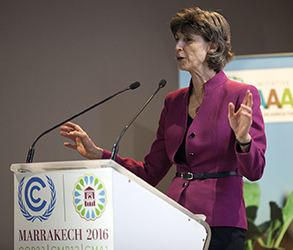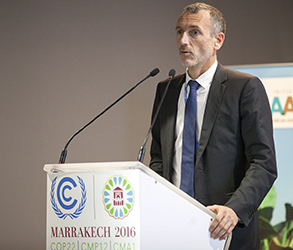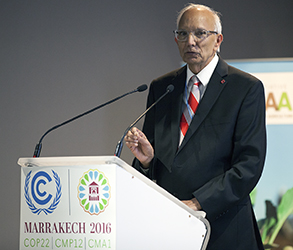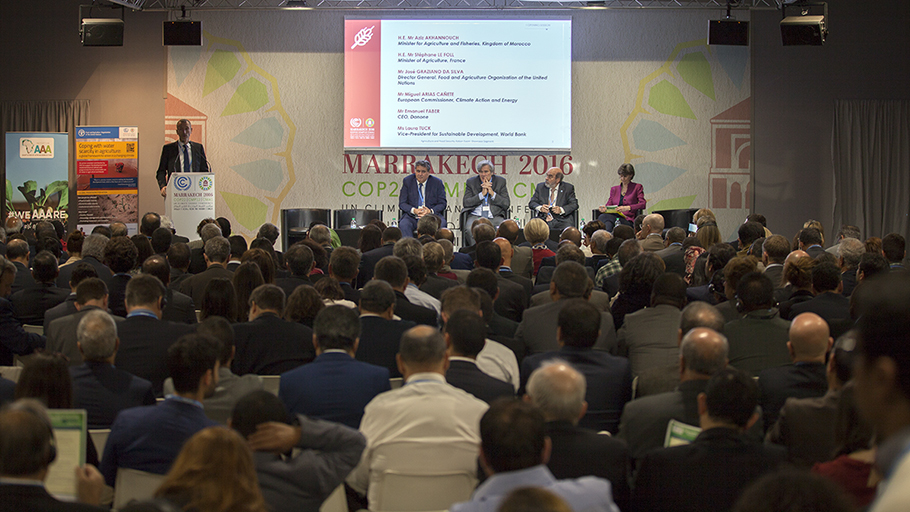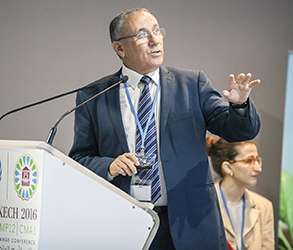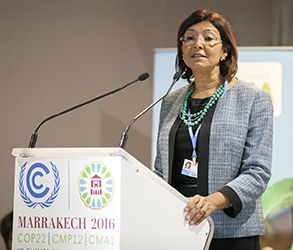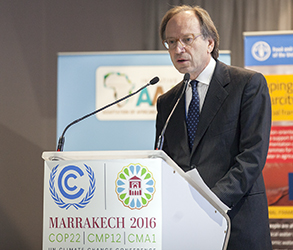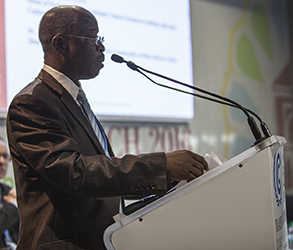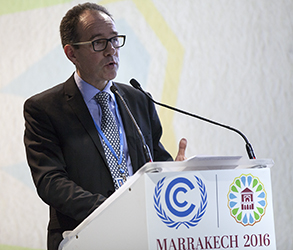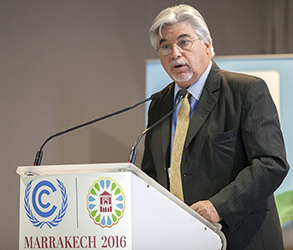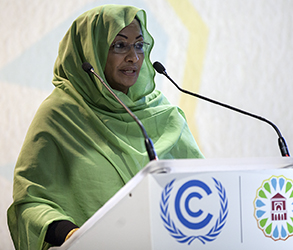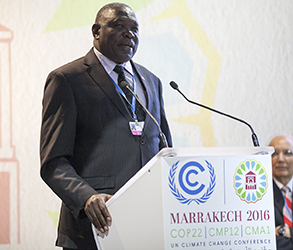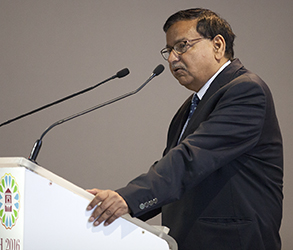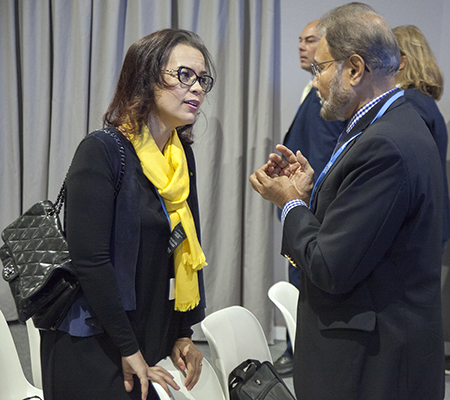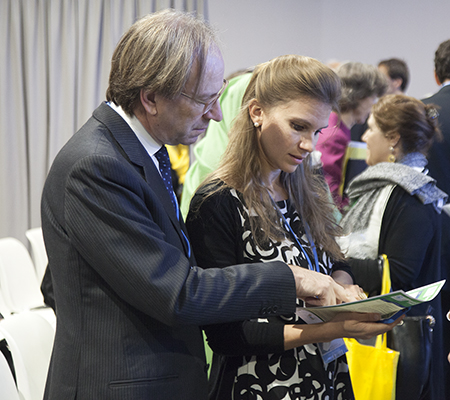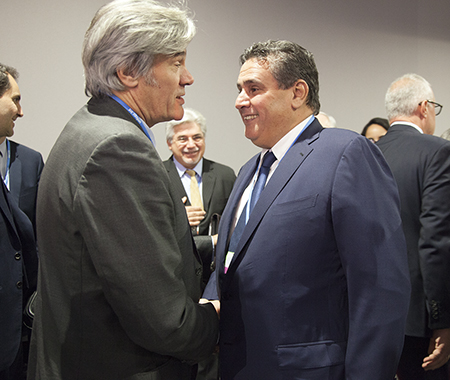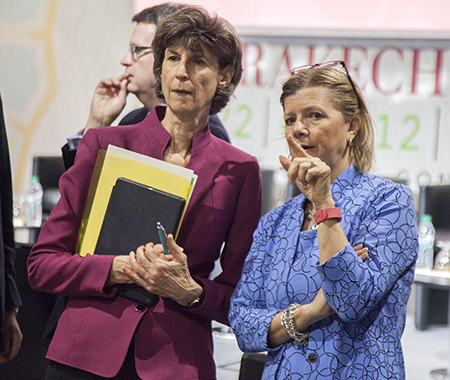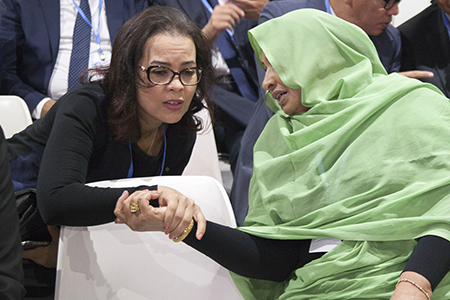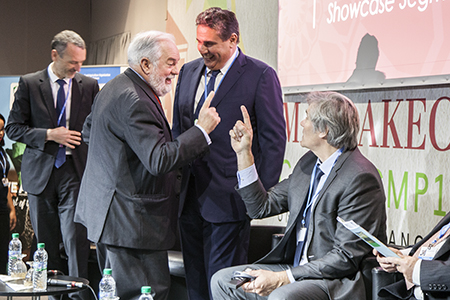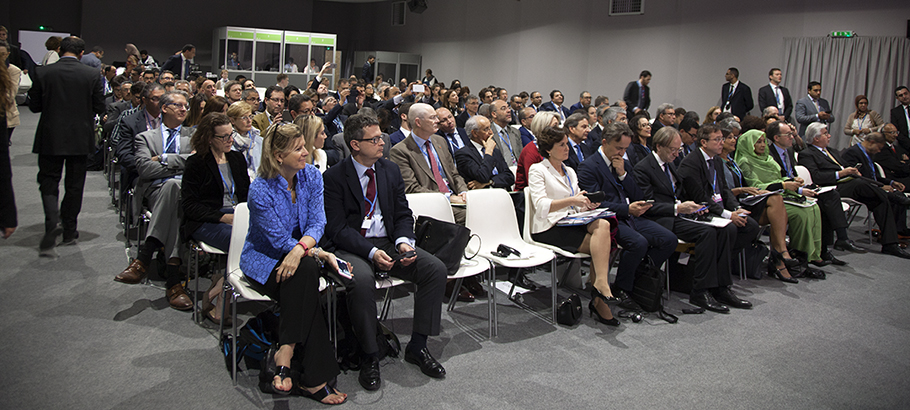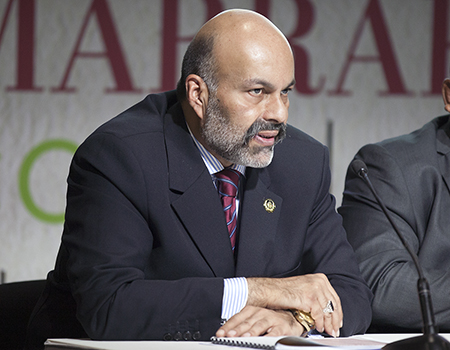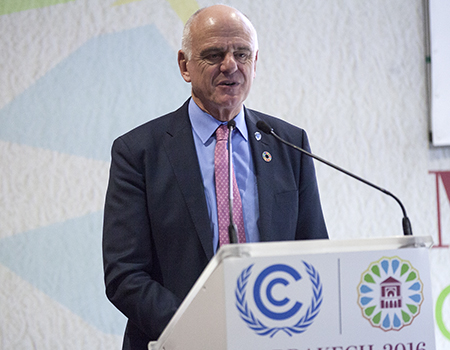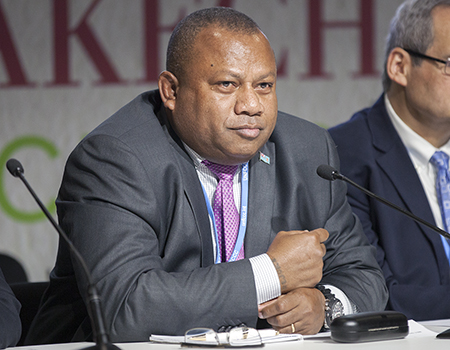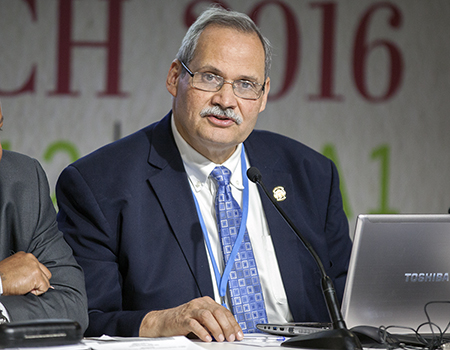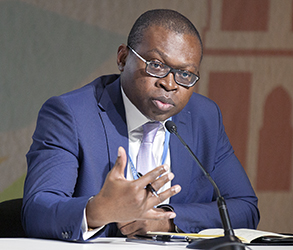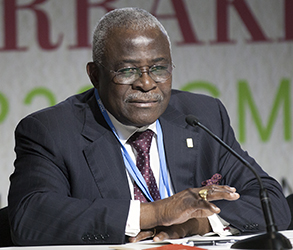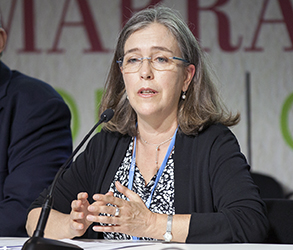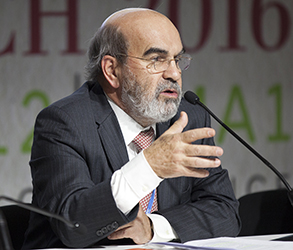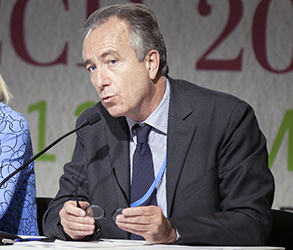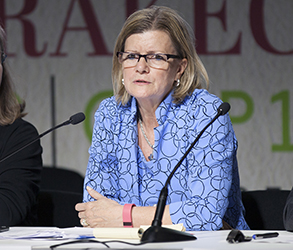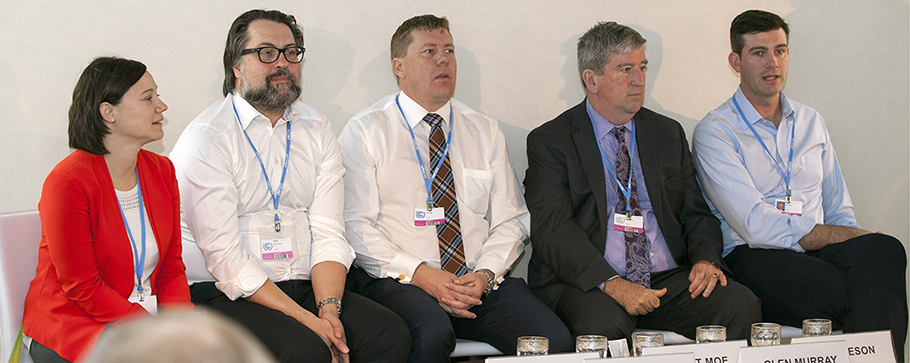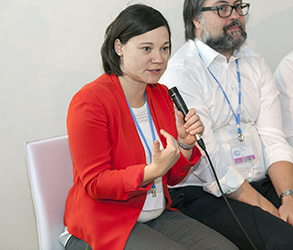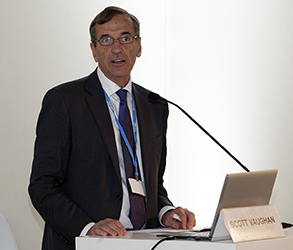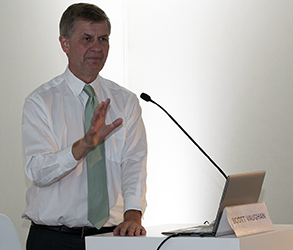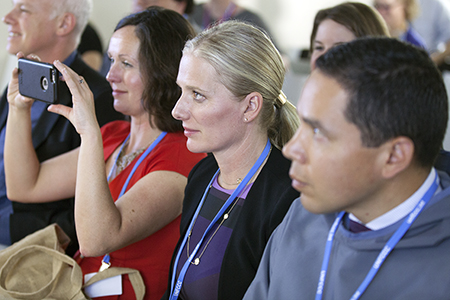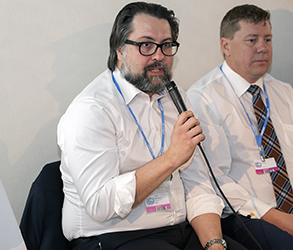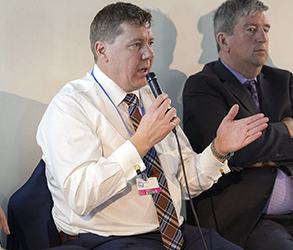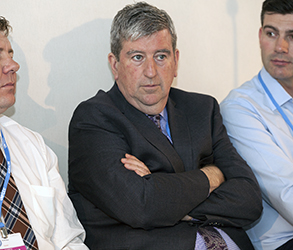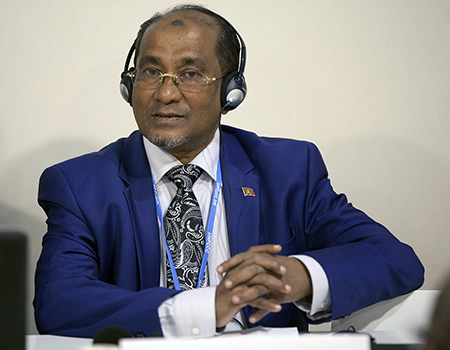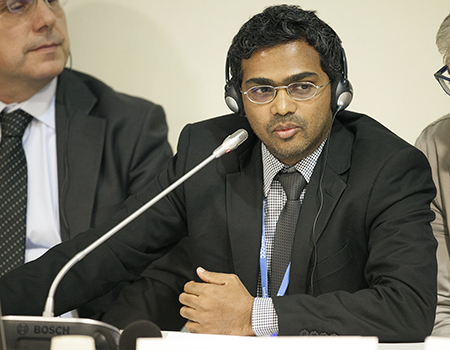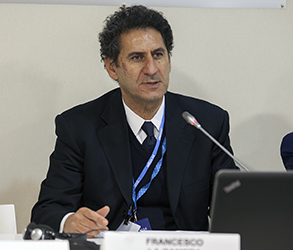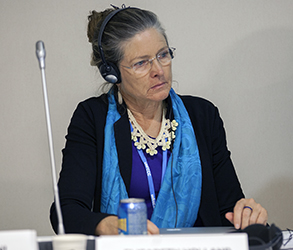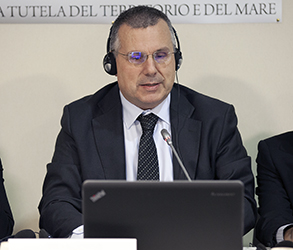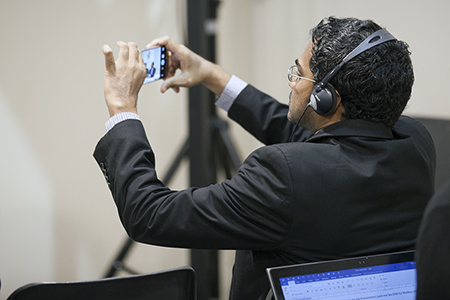Summary
The following side events were covered by ENBOTS on Wednesday, 16 November 2016:
- Agriculture and Food Security Action Event
- Climate Resilience for Agriculture and Food Security and Zero Hunger
- Pan-Canadian Climate Cooperation: High-Level Conference of the Parties Dialogue on Provincial and Federal Climate Action in Canada
- Ecosystem-based Approach for Climate Change Adaptation in the Maldives
IISD Reporting Services, through its ENBOTS Meeting Coverage, is providing daily web coverage from the Marrakech Climate Change Conference - November 2016.
Photos by IISD/ENB | Mike Muzurakis
For photo reprint permissions, please follow instructions at our Attribution Regulations for Meeting Photo Usage Page
Agriculture and Food Security Action Event Presented by the Food and Agricultural Organization of the UN (FAO)
The session was moderated by Rattan Lal, Ohio State University.
Miguel Arias Cañete, European Commissioner, Climate and Energy, underscored that agriculture can simultaneously address poverty, hunger and climate change. He noted that numerous countries have included agriculture in their Nationally Determined Contributions (NDCs).
Aziz Akhannouch, Minister for Agriculture and Fisheries, Morocco, said that those involved in Africa’s agriculture sector are the most affected by climate change, with 70% of the population linked to agriculture. He underscored that existing climate finance is insufficient to address food insecurity.
Stéphane Le Foll, Minister of Agriculture, France, emphasized that climate solutions must address agriculture and food security or they are not solutions. He stressed agriculture’s dual role in mitigation and adaptation, noting that organic matter in soils both sequesters carbon and increases productivity.
José Graziano da Silva, Director General, FAO, stressed that climate change poses a fundamental threat to food security, noting that 800 million suffer from hunger in the world, with a further 120 million at risk.
Pointing to the Adaptation of African Agriculture (AAA) initiative , Emmanuel Faber, CEO, Danone, highlighted the role of local agriculture and said the private sector should embrace it. Laura Tuck, Vice President for Sustainable Development, World Bank, reiterated the Bank’s commitment to financing climate-related activities. Mohammed Badraoui, Director General, National Agronomic Research Institute, Morocco, underscored the importance of the AAA initiative’s cross-cutting elements, including technology transfer, capacity building and South-South cooperation.
Maria Helena Semedo, Deputy Director-General, Natural Resources and Environment, FAO, introduced the FAO’s Global Framework for Action to Cope with Water Scarcity in Agriculture in the Context of Climate Change, which draws on the sector’s existing initiatives, tools and best practices.
Pietro Sebastiani, Director General, Development Cooperation, Italian Ministry of Foreign Affairs, highlighted the Milan Urban Food Policy Pact, in which 132 signatory cities commit to the development of sustainable, resilient and inclusive food chains. Jean-Baptiste Dollé, French Livestock Institute, highlighted the Life Beef Carbon project, which aims to reduce European beef production’s carbon footprint by 15% in the next decade compared to 2015.
Johnson Boanuh, Director of Environment, Economic Community of West African States (ECOWAS), launched ECOWAS’ Promotion of Climate-Smart Agriculture and Agro-Ecology Transition in West Africa initiative, which aims to enhance food security and resilience in rural communities.
Amira Gornass, Chair of the Committee on World Food Security (CFS), called for an integration of food security and nutrition concerns into climate change policies. Tabaré Aguerre, Minister of Livestock, Agriculture and Fisheries, Uruguay, noted Uruguay’s innovative initiative on soil management through the universal soil loss equation.
Charles Ogang, President, Uganda National Farmers Federation, emphasized the strategic importance of food security as part of climate change solutions. Saleemul Huq, Director, International Centre for Climate Change and Development, drew attention to the difficulty of measuring and aggregating adaptation.
During the discussion, participants addressed, inter alia: depletion of natural resources as a threat to global security; strategies to promote linkages between agricultural investments, policies and practice; and land-grabbing as a driver of food insecurity.
From L-R: Emmanuel Faber, CEO, Danone; Miguel Arias Cañete, European Commissioner, Climate Action and Energy; Aziz Akhannouch, Minister, Ministry of Agriculture and Fisheries, Morocco; Stéphane Le Foll, Minister of Agriculture, France; José Graziano da Silva, Director-General, FAO; and Laura Tuck, Vice President for Sustainable Development, World Bank
Miguel Arias Cañete, European Commissioner, Climate and Energy, highlighted the role of EU agriculture policy in increasing climate resilience in rural areas.
Stéphane Le Foll, Minister of Agriculture, France, highlighted France’s collaboration with FAO.
Aziz Akhannouch, Minister for Agriculture and Fisheries, Morocco, underscored the need to put agriculture at the heart of climate negotiations.
José Graziano da Silva, Director General, FAO, underscored that climate change is a cornerstone of FAO’s work, noting that FAO has executed more than 500 programmes related to climate change.
Laura Tuck, Vice President for Sustainable Development, World Bank, called for a redirection of current agricultural subsidies into climate-smart agriculture projects.
Emmanuel Faber, CEO, Danone, highlighted a project with 30,000 farmers in the Great Rift Valley of East Africa who get carbon credits for sustainable agriculture practices.
Rattan Lal, Ohio State University, moderated the discussion panel.
Room view during the high-level segment
Mohammed Badraoui, Director-General, National Agronomic Research Institute, Morocco, noted that the AAA initiative is core to six of the 17 SDGs.
Maria Helena Semedo, Deputy Director-General, Natural Resources and Environment, FAO, highlighted that 90% of NDCs refer to agriculture and 70% to water.
Pietro Sebastiani, Director-General, Development Cooperation, Italian Ministry of Foreign Affairs, underscored the importance of sustainable diets and nutrition.
Johnson Boanuh, Director of Environment, ECOWAS, said the Promotion of Climate-Smart Agriculture and Agro-Ecology Transition in West Africa initiative targets 25 million households by 2025.
Jean-Baptiste Dollé, French Livestock Institute, pointed to the fact that more than 2,000 farmers are involved in the Life Beef Carbon project.
Tabaré Aguerre, Minister of Livestock, Agriculture and Fisheries, Uruguay, underscored that it will be impossible to meet the food demands of 9.6 billion people without increasing food production.
Amira Gornass, Chair, CFS, said that CFS must bring together diverse stakeholders to develop policy guidance.
Charles Ogang, President, Uganda National Farmers Federation, stated that world leaders must “walk the talk” of the Paris Agreement.
Saleemul Huq, Director, International Centre for Climate Change and Development, said the scientific community is developing a methodology to measure adaptation.
Contacts:
- Rattan Lal | lal.1@osu.edu
More Information:
Climate Resilience for Agriculture and Food Security and Zero HungerPresented by the Food and Agriculture Organization of the UN (FAO), the International Fund for Agricultural Development (IFAD), the World Bank and the World Food Programme (WFP)

This side event, moderated by Paula Caballero, Global Director, Climate Program, World Resource Institute (WRI), concentrated on efforts combining the fights against hunger and climate change, focusing on countries’ experiences, and showcasing the importance of data and financial instruments in facilitating adaptation.
David Nabarro, UN Secretary-General’s Adviser on the 2030 Agenda for Sustainable Development, on behalf of the UN Secretary-General, noted that the second Sustainable Development Goal (SDG 2) on zero hunger by 2030 is crucial for achieving all SDGs, and secure economic development. Highlighting the challenge to support investments and climate adaptation, he stressed the need for people-centered, sustainable, inclusive and resilient agricultural systems.
Noting that erratic weather patterns, food insecurity and ongoing conflicts make living conditions unbearable for the poorest of the poor in Afghanistan, HRH Prince Mostapha Zaher, Director General, National Environmental Protection Agency, Afghanistan, called for engaging farmers, pastoralists and all stakeholders in a participatory process to address existing and future challenges.
Calling for the promotion of integrated farming to combat food insecurity, Inia Seruiratu, Minister for Agriculture, Rural and Maritime Development and National Disaster Management, Fiji, underscored, inter alia, the need for: capacity building; utilization of technology; and preservation of local knowledge, focusing on social rather than economic gains.
Emphasizing that food security has to do with both access to and supply of food, Luis Felipe Arauz Cavallini, Minister of Agriculture and Livestock, Costa Rica, highlighted food waste, noting that 10% of greenhouse gas (GHG) emissions in the US and UK come from the production, transport and preparation of food that is never consumed.
Viwanou Gnassounou, Assistant Secretary-General of the Africa, Caribbean and Pacific States Group, noted the need to make agriculture more attractive, bringing youth into the sector, scaling up investments and facilitating finance.
Noting that 80% of the Nationally Determined Contributions (NDCs) are linked to SDG 2, José Graziano da Silva, Director General, FAO, underscored the need for increased finance for the agricultural sector, urging support from relevant agents in a position to provide the necessary funds, such as the Global Environment Facility (GEF) and the Green Climate Fund (GCF).
Kanayo F. Nwanze, President, IFAD, called for additional support to: small farmers, focusing on climate-related finance to manage risks, as well as early warning systems; women, noting that when you support women, you invest in the community; and youth, in order to “capacitate” future farmers.
Highlighting climate change as a multiplier and accelerator of risks, Carlo Scaramella, Deputy Regional Director, Middle East, North Africa, Europe and Commonwealth of Independent States (CIS) countries, WFP, discussed WFP’s work on early warning systems, enabling anticipation of disasters, early interventions and mitigation of negative impacts.
Stressing that the agricultural sector is responsible for 25% of global emissions, but does not attract more than 3% of overall climate finance, Ethel Sennhauser, Director, Agriculture Global Practice, World Bank, underscored the need to continue raising awareness, and use the NDCs as an opportunity to show that the agricultural sector can be part of the solution to climate change.
In the ensuing discussion, participants addressed, inter alia: the role of traditional knowledge as complementary to that of science; investments in the service providers and the community towards climate-smart agriculture; the potential to use old technologies in adaptation efforts; and human rights considerations in food and agriculture, as well as ways to incorporate them in the work of the UN Framework Convention on Climate Change (UNFCCC).
From L-R: HRH Prince Mostapha Zaher, Director General of National Environmental Protection Agency of Afghanistan; Inia Seruiratu, Minister for Agriculture, Rural and Maritime Development and National Disaster Management, Fiji; Luis Felipe Arauz Cavallini, Minister of Agriculture and Livestock, Costa Rica; Paula Caballero, Global Director, Climate Program, WRI; and Viwanou Gnassounou, Assistant Secretary-General of the Africa, Caribbean and Pacific States Group
HRH Prince Mostapha Zaher, Director General of National Environmental Protection Agency of Afghanistan, invited climate change deniers to visit Afghanistan and witness glaciers’ melting.
David Nabarro, UN Secretary-General’s Adviser on the 2030 Agenda for Sustainable Development, on behalf of the UN Secretary-General, noted that agricultural sectors are leading elements of NDCs.
Inia Seruiratu, Minister for Agriculture, Rural and Maritime Development and National Disaster Management, Fiji, stressed that “the ways we live and cooperate are going to change.”
Luis Felipe Arauz Cavallini, Minister of Agriculture and Livestock, Costa Rica, noted that “we tend to see the impact of climate change on food security in a linear way, while interactions are far more complex.”
Viwanou Gnassounou, Assistant Secretary-General of the Africa, Caribbean and Pacific States Group, discussed ways to make agriculture more attractive to financing institutions.
Kanayo F. Nwanze, President, IFAD, said that “development is not something we do for people or to people, development is what people do for themselves.”
Paula Caballero, Global Director, Climate Program, WRI, noted that the Paris Agreement and the 2030 Agenda for Sustainable Development require a fundamental paradigm shift to more resilient, sustainable and inclusive production and consumption patterns.
From L-R: Kanayo F. Nwanze, President, IFAD; José Graziano da Silva, Director General, FAO; Paula Caballero, Global Director, Climate Program, WRI; Ethel Sennhauser, Director, Agriculture Global Practice, World Bank; and Carlo Scaramella, Deputy Regional Director, Middle East, North Africa, Europe and CIS countries, WFP
José Graziano da Silva, Director General, FAO, said that the impact of food waste is equivalent to that of deforestation.
Carlo Scaramella, Deputy Regional Director, Middle East, North Africa, Europe and CIS countries, WFP, urged for sophisticated systems at the global, regional, national and community levels to achieve better management of risks.
Ethel Sennhauser, Agriculture Global Practice, World Bank, underscored that “no other sector than agriculture can claim it can heal the planet.”
Contacts:
- Paula Caballero (Moderator) | Paula.Caballero@wri.org
- Julia Wolf (Coordinator) | Julia.Wolf@fao.org
More Information:
Pan-Canadian Climate Cooperation: High-Level Conference of the Parties Dialogue on Provincial and Federal Climate Action in CanadaPresented by the International Emissions Trading Association (IETA) and the International Institute for Sustainable Development (IISD)
Scott Vaughan, President and CEO, IISD, moderated this event.
Eric Solheim, Executive Director, UN Environment, said the success of the Montreal Protocol on Substances that Deplete the Ozone Layer came from citizen action, political leadership, and innovative power of markets and business. He highlighted that after the US election, there is uncertainty in the climate arena, but called for optimism, noting that 2015 had the most investment in solar and wind. He called for political leadership, noting that if the US is not able to lead, China is ready to do so and will need support from countries like Canada. He stressed that addressing climate change is an opportunity for new jobs, acknowledging that transition to low-carbon development may be challenging at the outset.
Shannon Phillips, Minister of Environment and Parks, Alberta, noted that the Province has its own carbon pricing architecture in place, including tax rebates and investments in renewable energy. She highlighted that the Province has capped emissions from the oil and gas sector, and underscored that the world must actively listen to working people in order to meet the challenges of transitioning to low-carbon development pathways.
David Heurtel, Minister of Sustainable Development, Environment and the Fight against Climate Change, Quebec, noted that a lot of work on climate was being done by intranational states. He pointed to partnerships with the city of Guadalajara, Mexico, on a cap-and-trade system, as well as with cities in China; noting that the role of intranational states is being recognized through the Climate Group. He drew attention to the adoption of the zero emission standards for vehicles; and noted that all the investment in cap-and-trade is itself leveraging further investment in green development.
Scott Moe, Minister of the Environment, Saskatchewan, noted that the Province is geographically large with a population of 1.15 million people, and called for greater global collaboration to address climate change. He highlighted the Province’s technology innovation in the agricultural industry, which accounts for about a third of Saskatchewan’s exports, expounding on specific research and development advancements in the sector.
Glen Murray, Ministry of Environment and Climate Change, Ontario, noted the Province’s interest in working with others to address climate change in a serious way. He stressed the use of market mechanisms, and provided examples of Ontario’s actions, including the circular economy bill and the cap-and-trade bill, stating that these will be instrumental to decarbonizing economies.
Don Iveson, Mayor of Edmonton, said that more than three quarters of Canadians live in urban areas, and welcomed the involvement of municipal governments in the implementation of the Paris Agreement. He underscored the need for carbon pricing, and noted that local governments are critical actors in implementing these policies. Stressing the leadership, innovation and partnerships of local governments, he underscored that local and indigenous voices are critical to addressing climate change. He noted that local leaders in the US should continue to work on climate change even if the federal government does not.
Underlining climate action as an opportunity for the country, Catherine McKenna, Minister for Environment and Climate Change, Canada, highlighted the efforts made at the local level, including the phasing out of coal in Ontario, zero-emissions vehicles in Quebec and a proposed cap on oil sands emissions in Alberta. She said that COP 22 should celebrate the historic achievements made during 2016, including the Kigali Amendment to the Montreal Protocol and the ICAO announcement, and then make concrete commitments to address climate at the national level.
Natan Obed, President, Inuit Tapiriit Kanatami, stressed the need for Indigenous Peoples to work with the government on adaptation and mitigation, but noted the distance between the government and the Indigenous Peoples in terms of policy and legislative space. He underscored the expectation that Indigenous Peoples will have a sustained and mutual partnership with the government at climate meetings.
From L-R: Shannon Phillips, Minister of Environment and Parks, Alberta; David Heurtel, Minister of Sustainable Development; Scott Moe, Minister of the Environment, Saskatchewan; Glen Murray, Ministry of Environment and Climate Change, Ontario; and Don Iveson, Mayor of Edmonton
Shannon Phillips, Minister of Environment and Parks, Alberta, noted that the ideal system to address climate change would be based on an economy-wide carbon price, and reinvestment of the revenues into the sectors that need it most.
Scott Vaughan, IISD, moderated this event.
Eric Solheim, Executive Director, UN Environment, urged adopting simpler language in environment discussions, calling for “kitchen conversations on climate,” and noting the name change from “UNEP” to “UN Environment.”
Shannon Phillips, Minister of Environment and Parks, Alberta, with David Heurtel, Minister of Sustainable Development, Environment and the Fight against Climate Change, Quebec
Catherine McKenna, Minister for Environment and Climate Change, Canada
David Heurtel, Minister of Sustainable Development, Environment and the Fight against Climate Change, Quebec, noted significant investments in clean energy and carbon pricing, highlighting that this has spurred jobs growth in the province.
Scott Moe, Minister of the Environment, Saskatchewan, noted ongoing climate change mitigation work in coal-fired power plants and in the reduction of methane emissions.
Glen Murray, Ministry of Environment and Climate Change, Ontario, noted that the Quebec-Ontario partnership is a leader in climate action, and underscored the reduction in energy costs in industrial manufacturing from the use of reused resources.
Contacts:
- Scott Vaughan (Moderator) | svaughan@iisd.org
More Information:
Ecosystem-based Approach for Climate Change Adaptation in the Maldives Presented by the Italian Ministry for the Environment, Land and Sea (IMELS), the Maldives and the University of Milano-Bicocca
Francesco La Camera, Director General, Ministry of Environment and Energy, Italy, highlighted the importance of working together with small island developing States (SIDS), which must be a priority in addressing climate change. He noted the Maldives faces challenges such as ocean acidification and coral reefs degradation. He underscored that the natural changes taking place are beyond the country’s resilience.
Abdullahi Majeed, Director General, Ministry of Environment and Energy, Maldives, noted adaptation cost can be reduced by using biodiversity and traditional knowledge. He outlined the Maldives’ initiatives to protect biodiversity, including the creation of a marine protected area (MPA). Majeed underscored that coral bleaching affects livelihoods, economy and biodiversity.
Paolo Galli, University of Milano-Bicocca, Italy, noted his University’s Marine Research and High Education Center (MaRHE) in the Maldives, bringing together academics from all over the world. He said to halt coral bleaching and coral diseases, we need to gather data and investigate the solutions, including biomolecular ecology and coral defence mechanisms.
Ahmed Waheed, Ministry of Environment and Energy, Maldives, outlined water security challenges faced by the Maldives, which will be increased by climate change, including: water scarcity; traditional dependency on shallow wells for multipurpose water use; water-borne diseases; flooding; groundwater pollution; and saltwater intrusion. He outlined integrated water resource management measures implemented in the Maldives to tackle such challenges.
Salvatore Mazzola, National Research Centre (CNR), Italy, highlighted the impacts of acoustic pollution on marine life, individual animals and entire species. He underscored research and measurements being carried out to further understand the impacts of sound frequency and intensiveness, as well as their effects in the Maldives, the Mediterranean and the Arctic.
Valerio Perusini, e-Geos, Italy, noted that Earth observation satellites support climate change monitoring, measuring both climate causes and effects. He said that remote sensing and pixel dimension combined with temporal resolution provide accurate measures and higher resolution of data.
Elisabeth Holland, Pacific Centre for Environment and Sustainable Development, Fiji, said oceans define the culture and the very being of SIDS populations, delivering livelihoods for families. She noted that her team has supported 120 communities in many SIDS to promote climate resilience and fishery resources.
From L-R: Valerio Perusini, e-Geos, Italy; Elisabeth Holland, Pacific Centre for Environment and Sustainable Development, Fijj; Paolo Galli, University of Milano-Bicocca, Italy; Ahmed Waheed, Ministry of Environment and Energy, the Maldives; and Salvatore Mazzola, CNR, Italy
Abdullahi Majeed, Director General, Ministry of Environment and Energy, the Maldives, emphasized that actions must be implemented combining the Rio Conventions and SDGs.
Ahmed Waheed, Director General, Ministry of Environment and Energy, the Maldives, outlined vulnerability indicators in the Maldives.
Francesco La Camera, Director General, Italian Ministry of Environment and Energy, highlighted the Italian tradition of working in partnership with SIDS.
Underscoring work on the ground, Elisabeth Holland, Pacific Centre for Environment and Sustainable Development, Fijj, noted that oceans define the culture of the SIDS populations.
Paolo Galli, University of Milano-Bicocca, Italy, noted the structural complexity of coral reefs and that they are the habitat for numerous species.
Contacts:
- Vignola Emmanuela | Vignola.Emmanuela@minammbiente.it
More Information:
About
| 7 Nov
| 8 Nov
| 9 Nov
| 10 Nov
| 11 Nov
| 12 Nov
| 14 Nov
| 15 Nov
| 16 Nov
| 17 Nov
| 18 Nov
| Summary
The Earth Negotiations Bulletin on the Side (ENBOTS) © <enb@iisd.org> is a special publication of the International Institute for Sustainable Development (IISD). This issue has been written by Karen Alvarenga, Katherine Browne, Bo-Alex Fredvik, Tallash Kantai, Jennifer Lenhart, Ph.D., Kate Louw, Miquel Muñoz Cabre, Nicole de Paula, and Asterios Tsioumanis, Ph.D. The Digital Editors are Mike Muzurakis and Liz Rubin. The Editor is Elena Kosolapova, Ph.D. <elena@iisd.org>. The Director of IISD Reporting Services is Langston James “Kimo” Goree VI <kimo@iisd.org>. The opinions expressed in ENBOTS are those of the authors and do not necessarily reflect the views of IISD and funders. Excerpts from ENBOTS may be used in non-commercial publications only with appropriate academic citation. For permission to use this material in commercial publications, contact the Director of IISD Reporting Services at <kimo@iisd.org>. Electronic versions of issues of ENBOTS from the Marrakech Climate Change Conference - November 2016, can be found on the IISD Reporting Services website at http://enb.iisd.org/climate/cop22/enbots/. The ENBOTS Team at the Marrakech Climate Change Conference - November 2016, can be contacted by e-mail at <tallash@iisd.org>.
Specific funding for coverage of the Marrakech Climate Change Conference - November 2016, has been provided by the Ministry of the Environment and Protection of Land and Sea of Italy, and the Kingdom of Saudi Arabia
The Earth Negotiations Bulletin on the Side (ENBOTS) © <enb@iisd.org> is a special publication of the International Institute for Sustainable Development (IISD). This issue has been written by Karen Alvarenga, Katherine Browne, Bo-Alex Fredvik, Tallash Kantai, Jennifer Lenhart, Ph.D., Kate Louw, Miquel Muñoz Cabre, Nicole de Paula, and Asterios Tsioumanis, Ph.D. The Digital Editors are Mike Muzurakis and Liz Rubin. The Editor is Elena Kosolapova, Ph.D. <elena@iisd.org>. The Director of IISD Reporting Services is Langston James “Kimo” Goree VI <kimo@iisd.org>. The opinions expressed in ENBOTS are those of the authors and do not necessarily reflect the views of IISD and funders. Excerpts from ENBOTS may be used in non-commercial publications only with appropriate academic citation. For permission to use this material in commercial publications, contact the Director of IISD Reporting Se.png" alt="FOEN" />


IISD Reporting Services is grateful to the many donors of the Earth Negotiations Bulletin (ENB) and recognizes the following as core contributors to the ENB: the European Union, the Government of Switzerland (the Swiss Federal Office for the Environment (FOEN)), the Italian Ministry for the Environment, Land and Sea, and the Kingdom of Saudi Arabia. General Support for the Bulletin during 2016 is provided by the German Federal Ministry for the Environment, Nature Conservation, Building and Nuclear Safety (BMUB), the New Zealand Ministry of Foreign Affairs and Trade, SWAN International, the Finnish Ministry for Foreign Affairs, the Japanese Ministry of Environment (through the Institute for Global Environmental Strategies - IGES), the United Nations Environment Programme (UNEP), and the International Development Research Centre (IDRC). Funding for translation of the Bulletin into French has been provided by the Government of France, the Wallonia, Québec, and the International Organization of La Francophonie/Institute for Sustainable Development of La Francophonie (IOF/IFDD).
Resources for the Marrakech Climate Change Conference - November 2016
- Website for the Marrakech Climate Change Conference - November 2016
- Website for Side Events and Exhibits at the Marrakech Climate Change Conference - November 2016
- Schedule of Side Events at the Marrakech Climate Change Conference - November 2016
- Overview Schedule for the Marrakech Climate Change Conference - November 2016
- Host Country Website
IISD ENB/ENB+ Meeting Coverage
- 44th Session of the Intergovernmental Panel on Climate Change (IPCC-44), 17-20 October 2016, United Nations Conference Centre (UNCC), Bangkok, Thailand
- Bonn Climate Change Conference - May 2016, 16-26 May 2016, Bonn, Germany
- High-Level Signature Ceremony for the Paris Agreement on Climate Change, 22 April 2016, UN Headquarters, New York
- IPCC-43, 11-13 April 2016, Headquarters of the United Nations Environment Programme (UNEP), Nairobi, Kenya
- Paris Climate Change Conference - November 2015, 29 November - 13 December 2015, Paris, France
- Coverage of Side Events at the Paris Climate Change Conference - November 2015, 29 November - 11 December 2015, Paris, France
- Bonn Climate Change Conference - October 2015, 19-23 October 2015, Bonn, Germany
- IPCC-42, 5-8 October 2015, Dubrovnik, Croatia
- Bonn Climate Change Conference - August 2015, 31 August - 4 September 2015, Bonn, Germany
- Bonn Climate Change Conference - June 2015, 1-11 June 2015, Bonn, Germany
- Coverage of Side Events at the Bonn Climate Change Conference - June 2015, 1-11 June 2015, Bonn, Germany
- 9th Meeting of the Green Climate Fund (GCF) Board, 24-26 March 2015, Songdo, Republic of Korea
- IPCC-41, 24-27 February 2015, UN Environment Programme (UNEP) headquarters, Nairobi, Kenya
- Geneva Climate Change Conference - February 2015, 8-13 February 2015, Geneva, Switzerland
- Lima Climate Change Conference - December 2014, 1-14 December 2014, Lima, Peru
- Coverage of Side Events at the Lima Climate Change Conference - December 2014, 1-12 December 2014, Lima, Peru
- IPCC-40, 27-31 October 2014, Copenhagen, Denmark
- Bonn Climate Change Conference - October 2014, 20-25 October 2014, Bonn, Germany
- UN Climate Summit 2014 - “Catalyzing Action”, 23 September 2014, UN Headquarters, New York
- Bonn Climate Change Conference - June 2014, 4-15 June 2014, Bonn, Germany
- 12th Session of the IPCC Working Group III (WGIII-12) and IPCC-39, 7-12 April 2014, Berlin, Germany
- Bonn Climate Change Conference - March 2014, 10-14 March 2014, Bonn, Germany
- WGII-10 and IPCC-38, 25-29 March 2014, Yokohama, Japan
- IPCC-37, 14-17 October 2013, Batumi, Georgia
- IPCC-36, 23-26 September 2013, Stockholm, Sweden
Additional IISD Resources
- CLIMATE-L - A Mailing List for News on Climate Change Policy
- SDG Knowledge Hub - An online resource center for news and commentary regarding the implementation of the United Nations’ 2030 Agenda for Sustainable Development, including all 17 Sustainable Development Goals (SDGs)
- Linkages Update - Bi-weekly International Environment and Sustainable Development News
© 2016, IISD Reporting Services. All rights reserved. | Photography Usage
